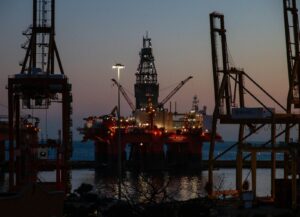It might not have the same headline-grabbing power as immigration, but the issue of how EU membership impacts the UK’s energy supply has been brought into sharp focus by Andrea Leadsom.
Speaking on behalf of the Vote Leave campaign, the energy minister was emphatic. The UK is better off going it alone.
‘Put simply, the lights will not go out, bills will not go up, and decarbonisation will not stall as a result of leaving the EU,’ she said.
Ms Leadsom was also quick to point out that the UK is not reliant on Russia for gas, with 40% of our own supplies coming straight from the North Sea. And furthermore, she said if we stayed in the EU we would be subject to new plans, which would make member states take on responsibility for each other’s gas security.
‘If we remain part of the Energy Union and another member state faces problems with their gas security – perhaps because of a political dispute with a supplier – we will be required to deprive our own small businesses of energy here at home,’ said the minister.
But was this a case of political scaremongering? As Emily Waterfield, an environment correspondent at Mlex, an independent agency providing insight and analysis, states, under the plans the UK would only be bound to help out the Republic of Ireland and this merely replicates an existing deal between the two countries.
‘It wouldn’t change anything,’ explains Ms Waterfield. ‘The UK would have to help Ireland in times of crisis, and Ireland would have to help the UK. It’s a deal struck on its own and not under EU rules.’
We are going to be increasingly reliant on diplomacy and investment to get new supply contracts. Those things, to some extent, are dependent on EU membership. It could be harder to get those things on our own – Emily Waterfield, Mlex
Regarding any possible impact, Ms Waterfield says being part of the EU has helped shape the current mix of energy in this country.
‘The UK has invested in renewables, and that might not have happened without the EU,’ she adds. ‘And more importantly, we do have physical interconnections within the EU block and Norway. They are encouraged by EU membership. It is also easier to get EU funding for energy infrastructure if affects more than one country.
‘In the medium to longer term, the energy mix in the UK will change. Some of that is due to domestic choices, like nuclear power and shale gas. But the UK’s fossil fuel supplies are dwindling. Not so long ago, we were an international powerhouse when it came to oil and gas. That’s no longer the case and it will not get any better.
‘As the energy mix develops, we are going to be increasingly reliant on diplomacy and investment to get new supply contracts. Those things, to some extent, are dependent on EU membership. It could be harder to get those things on our own.’
And Mlex’s chief correspondent, Lewis Croft, said while Ms Leadsom was correct in stating that the UK is not reliant on Russian gas supplies, unlike other member states, that might change in the future.
‘The UK’s energy demands are likely to increase and some sources could decrease, so there is a prospect of having to buy some energy from Russia, and in this case, being part of the EU would help,’ said Mr Croft.
















